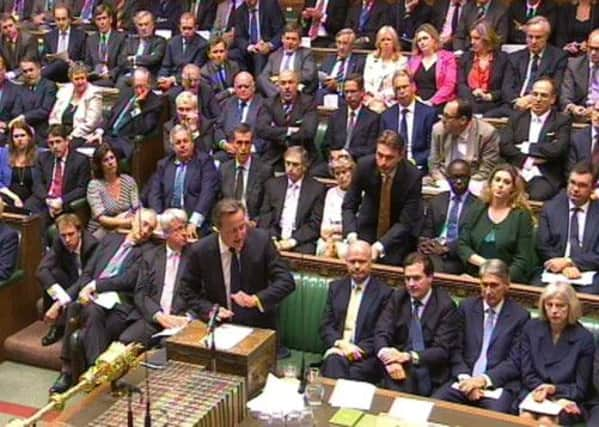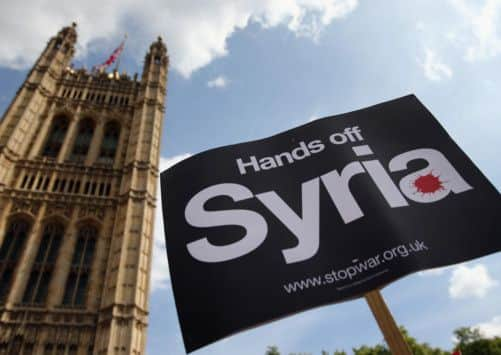Syria: Cameron defeated on UK military action


The Prime Minister had offered the compromise of a second vote before any such action. But rebel Tory and Lib Dem MPs joined Labour in voting down the government proposal by 285 to 272.
Mr Cameron was immediately challenged by Labour leader Ed Miliband not to use the royal prerogative to ignore the vote and join the United States and other allies in taking action against Bashar al-Assad’s regime, which the Prime Minister had described as “war criminals” after its alleged use of chemical weapons against its own people.
Advertisement
Hide AdAdvertisement
Hide AdIn an admission of defeat, Mr Cameron replied: “It’s clear to me that the British parliament and the British people do not wish to see military action; I get that, and I will act accordingly.”


Shadow defence secretary Jim Murphy said: “I think … the relationship between Mr Cameron as Prime Minister and many of his own MPs is now fractured. They’re unwilling to take him at his word, unwilling to accept his assurances and reassurances and that’s why such a substantial number voted with Labour this evening.”
Education Secretary Michael Gove shouted “You’re a disgrace” at Tory and Lib Dem rebels, according to the SNP’s Westminster leader, Angus Robertson.
“He had to be persuaded to calm down by a number of his colleagues,” he said. “I retorted, ‘It’s called democracy’, because that was what happened. We’ve finally learned the lessons from Iraq.”
Senior Lib Dem MP Sir Menzies Campbell said no-one could remember the last time a government had been defeated on an issue of such magnitude. He said he had supported the government’s motion but worried there was “no end game”.
Labour’s Lord Adonis tweeted: “Tonight maybe the most significant Commons defeat for a govt on a single issue since devolution went down in 1976. Ramifications huge.”
Defence Secretary Philip Hammond said military action against the Assad regime would probably still go ahead.
“I expect that the US and other countries will continue to look at responses to the chemical attack,” he said. “They will be disappointed that Britain will not be involved. I don’t expect that the lack of British participation will stop any action.”
Advertisement
Hide AdAdvertisement
Hide AdIn a statement after the Commons vote, the White House said: “The US will continue to consult with the UK government – one of our closest allies and friends.
“President Obama’s decision-making will be guided by what is in the best interests of the United States. He believes that there are core interests at stake and that countries who violate international norms regarding chemical weapons need to be held accountable.”
MPs had been recalled early after the Assad regime’s alleged use of those weapons. Mr Cameron had initially hoped to get support for possible military action against Syria as soon as this weekend. But after Labour refused to back immediate action, and amid a threatened rebellion from his back-benches, he wat-ered down his motion to promise a second vote next week.
However, he failed to satisfy his critics and was dealt a political defeat that has raised questions about his judgment and credibility.
During the Commons debate, the Prime Minister admitted the decision to act was a “judgment call”, saying there could be no “100 per cent certainty” about who used chemical weapons in eastern Damascus on 21 August.
He told MPs there was not “one smoking piece of intelligence”. However, he was convinced by the evidence that it was “beyond doubt” Mr Assad’s regime had been responsible for the attacks in which hundreds are thought to have died.
He said he feared that if the international community did not act, the Syrian president would feel he could act with impunity again in the use of such weapons. In an at times emotional statement, Mr Cameron said military action was “not about taking sides” in the Syrian civil war but a response to “one of the most abhorrent uses of chemical weapons in a century – slaughtering innocent men, women and children”.
He added: “There is no 100 per cent certainty about what action might succeed or fail, but let me say this: I think we can be as certain as possible that when we have a regime that has used chemical weapons on 14 occasions, that is most likely responsible for this large-scale attack, that if nothing is done, it will conclude it can use these weapons again and again and on a larger scale, and with impunity.”
Advertisement
Hide AdAdvertisement
Hide AdMr Miliband had made it clear his party could not support the government. That provoked an angry response from No 10, with a spokesman for Mr Cameron accusing Labour of “giving succour to the Assad regime”.
The political rancour came as the US said it was preparing to publish more evidence that the Assad regime had been responsible for the chemical weapons attack. However, reports from the US suggested Barack Obama’s administration was now ready to delay taking action.
In Syria, United Nations weapons inspectors resumed their investigations, and UN Secretary-General Ban Ki-moon said he expected their report to be handed in over the weekend.
Earlier, Mr Cameron published legal advice from the Attorney General that said military action without a UN resolution would be lawful. He also said a report from the joint intelligence committee (JIC) had pointed the finger at the Assad regime.
During the debate, the Prime Minister suggested Mr Assad might have been “testing the boundaries” with his previous uses of chemical weapons.
“He wants to know whether the world will respond to the use of these weapons which I suspect, tragically and repulsively, are proving quite effective on the battlefield,” Mr Cameron said.
“In the end, we can’t know the mind of this brutal dictator – all we can do is make a judgment about whether it is better to act or not to act and make a judgment about whether he is responsible or not responsible.”
Mr Cameron described Assad as “a war criminal” and he visibly choked when he referred to the videos of victims of the attack which he urged MPs to “force themselves to watch”.
Advertisement
Hide AdAdvertisement
Hide AdBut Mr Miliband insisted any decision should be based on the fullest information, saying: “Evidence should precede decision, not decision precede evidence.”
Former foreign secretary Sir Malcolm Rifkind, chairman of the JIC, said: “If they get away with what they have done, if there is no significant international response, then we can be absolutely certain that the forces within Damascus will be successful in saying we must continue to use these whenever there is a military rationale for doing so.”
Analysis: ‘Defeat the inevitable conclusion for a Prime Minister who has lost control of his party’
DAVID Cameron has suffered a string of embarrassing rebellions during his three years as Prime Minister, but none has been as devastating as the defeat inflicted on him last night.
Gay marriage, Lords reform and Europe have been the most problematic areas for Mr Cameron before, but these were always a question of ideology not of judgment.
However, the previous rebellions have emboldened the Tory back-benches into voting against their own government and with their conscience and last night was the inevitable conclusion for a Prime Minister and a leader who has lost control of his party.
Mr Cameron had put much of his personal credibility into action on Syria. He has clearly been itching to have a go at the Assad regime in the same way he and former French president Nicolas Sarkosy toppled the Gaddafi regime in Libya. The use of chemical weapons finally appeared to provide the moral and legal case for such action and Mr Cameron went to the lengths of recalling parliament early to push it through.
However, by doing so he managed to underline the weakness of his own leadership.
Advertisement
Hide AdAdvertisement
Hide AdBy Wednesday, it was obvious that he needed Labour’s support because he was faced with a massive rebellion on his own back-benches. When Ed Miliband refused to give that support Mr Cameron was forced to compromise at the last minute with the promise of a second vote and more time.
Even this failed to convince his critics and the rebellion by many Tory MPs, including hawks, and Labour’s continued refusal to back the government motion, meant he was not only defeated but that many in his own party publicly questioned his ability to make the right judgment on the biggest decision of all – the decision to go to war.
It is hard to see how Mr Cameron can fully restore his credibility, not least in his own party.
He himself had admitted it was “a judgment call”. Last night parliament said his judgment was wrong.
UK has legal grounds for military intervention even if not sanctioned by security council
Here is an abridged version of the government’s legal position on military action in Syria:
The use of chemical weapons by the Syrian regime is a serious crime of international concern, as a breach of the customary international law prohibition on use of chemical weapons, and amounts to a war crime and a crime against humanity. However, the legal basis for military action would be humanitarian intervention; the aim is to relieve humanitarian suffering by deterring or disrupting the further use of chemical weapons.
The UK is seeking a resolution of the UN security council under Chapter VII of the Charter of the United Nations which would condemn the use of chemical weapons by the Syrian authorities; demand that the Syrian authorities strictly observe their obligations under international law and previous security council resolutions, including ceasing all use of chemical weapons; and authorise member states, among other things, to take all necessary measures to protect civilians in Syria from the use of chemical weapons and prevent any future use of Syria’s chemical weapons; and refer the situation in Syria to the International Criminal Court.
Advertisement
Hide AdAdvertisement
Hide AdIf action in the security council is blocked, the UK would still be permitted under international law to take exceptional measures in order to alleviate the scale of the overwhelming humanitarian catastrophe in Syria by deterring and disrupting the further use of chemical weapons by the Syrian regime. Such a legal basis is available, under the doctrine of humanitarian intervention, provided three conditions are met:
1. there is convincing evidence, generally accepted by the international community as a whole, of extreme humanitarian distress on a large scale, requiring immediate and urgent relief;
2. it must be objectively clear that there is no practicable alternative to the use of force if lives are to be saved; and
3. the proposed use of force must be necessary and proportionate to the aim of relief of humanitarian need and must be strictly limited in time and scope to this aim (i.e. the minimum necessary to achieve that end and for no other purpose).
Europeans less keen on any action
The majority of French and Germans oppose Western military intervention in Syria and do not want their countries to provide backing for any US-led strike, recent polling has found.
A poll published yesterday for ZDF television in Germany found that 58 per cent oppose intervention following last week’s suspected poison gas attacks, with 33 per cent in favour and 9 per cent undecided.
The poll found 41 per cent believe Germany should support financially or materially US-led military action, with 55 per cent opposed.
Meanwhile, in France a new poll suggests nearly three in five French people would oppose the country joining any military action in Syria.
Advertisement
Hide AdAdvertisement
Hide AdThe survey for Le Figaro newspaper came after French President François Hollande and the United States have made it clear that they believe punitive action is warranted against Syria for its alleged use of chemical weapons.
Forty-one per cent of respondents said they would favour military action by France. Fifty-nine per cent opposed it.
SEE ALSO